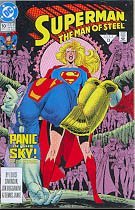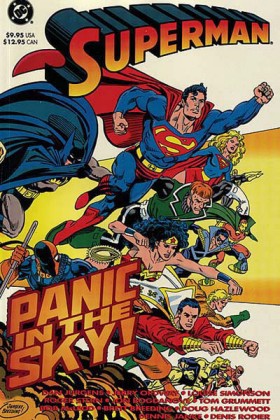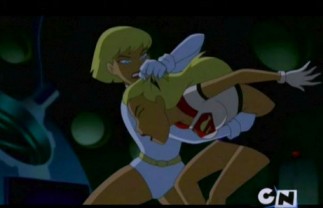|
Derek's
Continuity Corner: "Panic in the Sky"
"Panic
in the Sky" was the name of a fairly big Superman storyline
in the early 90s, one that proved defining for that era's
Supergirl and served as an entry point for Captain Marvel
to return to appearing regularly in DC books.
Since
the JLU
episode defines their Supergirl, I'll focus there.
During
the Silver Age, Supergirl had been Kara Zor-El, Superman's
younger cousin from Argo City, a piece of Krypton that had
survived in a bubble for years in space. When kryptonite
broke their shield, Kara's parents put her in a rocket and
sent her to Earth. Found by her adult cousin, Kara assumed
the identity of Supergirl but operated in secret for many
years for reasons that must have sense to Mort Weisinger.
Though
DC tried giving her a book of her own several times, nothing
seemed to stick with the fans, and so Kara bit the big one
in Crisis on Infinite Earths. Of course that meant
that she was suddenly everybody's favorite, and her absence
from the DCU was keenly felt by fans everywhere. The problem
was that in John Byrne's reboot of Superman, he had no room
for a younger cousin, as the creator was determined that
Superman would indeed be "the LAST son of Krypton." And
that included daughters.
After
a couple of years, he figured out how to introduce a Supergirl,
though. In a moment spoiled for me by my best friend Marcus,
explorers in the Arctic found Supergirl frozen in the ice.
This Supergirl at first claimed to be an alternate universe's
Lana Lang, but it turned out that she was actually a clone
of Lana created by Lex Luthor - a good Lex Luthor inhabiting
a "pocket universe" that Byrne created to sort of explain
how the Legion of Super-Heroes could have recruited Superboy
into their ranks when he now said there was no Superboy.
Yes, the Crisis caused many more headaches than it cured.
 |
This
clone also turned out to be a shape-shifter, and this proved
the crux of her role in "Panic in the Sky." After spending
time at the Kent farm, the new Supergirl decided she would
become Superman herself; after all, what's gender to a shape-shifter?
She drove herself harder and harder, until being made to
realize that she needed to find her own identity. Naturally,
she left Earth to do it.
In
space she was captured and put into service on Warworld,
entertaining the masses with super bloodsport. Her mightiest
opponent and leader of a secret rebellion was the brutish
but sensitive Draaga, a warrior inspired by Superman's time
on Warworld. Together they fought for freedom, and when
Draaga died Supergirl proved she had learned nothing and
put nightmares into our heads by fighting as Draaga
for a while.
Escaping
to Earth, Supergirl was followed by Warworld, a mobile planet
that Justice League used in its first season. It
turned out that Superman's old enemy Brainiac was in control,
and hordes of aliens invaded Earth as Superman rallied the
heroes together to defend their home and ended up destroying
Warworld.
"Panic
in the Sky" became important because the next time that
a very, very ticked off Mongul appeared, it was in the wake
of the Death of Superman. The alien warlord schemed with
the Cyborg Superman to turn Earth into a new Warworld. As
part of the plan, the villains destroyed Coast City, an
event which drove Green Lantern insane and started a domino
effect that led to years and years of Hal Jordan being a
villain, then a spirit of vengeance until finally being
rehabilitated by Geoff Johns this year.
At
the end of "Panic in the Sky," Supergirl decided that looking
like a young hot blonde suited her best, and she settled
on a fairly classic look before hooking up with Lex Luthor
II, not knowing that he was, actually, Lex Luthor I and
still eeeeeeeevil. This version of Supergirl never had much
taste in men, as her boyfriends also include a demon. Peter
David later added on that she was an earthbound angel, writing
the character's best-received and longest run (75 issues)
before DC decided they wanted a cleaner continuity and just
started from scratch last year. Once again, Supergirl is
Kara Zor-El, but some secrets still remain...
The
version on the animated series, however, may have the highest
profile in the public consciousness, and for the last third
of David's run, Supergirl adopted the animated version's
outfit, though she also felt a little silly doing it. When
Mattel released its Barbie DC dolls, the Supergirl outfit
they used was the animated one.
Though
the animated Kara treats Superman as her cousin, he actually
isn't. Her origin follows the Silver Age version fairly
closely, but with a crucial difference: she is the last
survivor of the planet Argo, which had been an ally of Krypton's
and adapted much of its culture. So when Superman found
her in Superman: The Animated Series, she spoke Kryptonian
and had his markings, but only because her family had prepared
her to do so. Still, the Kents took her in and made her
one of the family.
This
revamped origin, which kept the best of the Silver Age while
respecting John Byrne's wishes to have Superman be the lone
Kryptonian, came from the minds of Evan Dorkin and Sarah
Dyer. I just want to give them all due credit, because thanks
to that Supergirl Barbie, one Fanboy father got to bring
his world together with his daughter's.
|








